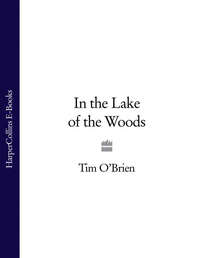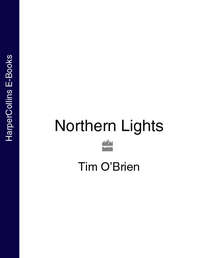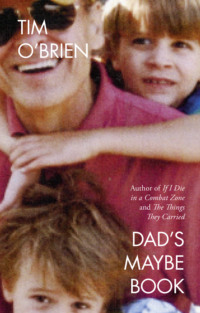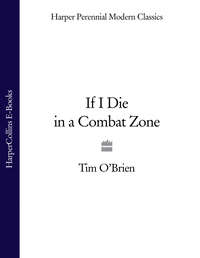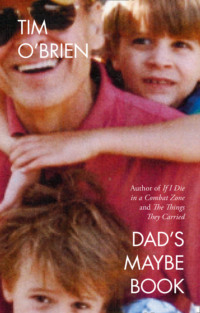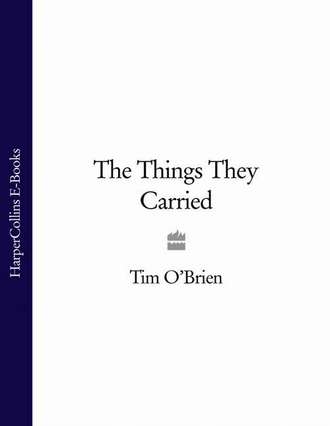
Полная версия
The Things They Carried
‘Right,’ I said.
He got into his car and rolled down the window. ‘Make me out to be a good guy, okay? Brave and handsome, all that stuff. Best platoon leader ever.’ He hesitated for a second. ‘And do me a favor. Don’t mention anything about –’
‘No,’ I said, ‘I won’t.’
SPIN
THE WAR WASN’T ALL TERROR and violence. Sometimes things could almost get sweet. For instance, I remember a little boy with a plastic leg. I remember how he hopped over to Azar and asked for a chocolate bar – ‘GI number one,’ the kid said – and Azar laughed and handed over the chocolate. When the boy hopped away, Azar clucked his tongue and said, ‘War’s a bitch.’ He shook his head sadly. ‘One leg, for Chrissake. Some poor fucker ran out of ammo.’
I remember Mitchell Sanders sitting quietly in the shade of an old banyan tree. He was using a thumbnail to pry off the body lice, working slowly, carefully depositing the lice in a blue USO envelope. His eyes were tired. It had been a long two weeks in the bush. After an hour or so he sealed up the envelope, wrote FREE in the upper right-hand corner, and addressed it to his draft board in Ohio.
On occasions the war was like a Ping-Pong ball. You could put fancy spin on it, you could make it dance.
I remember Norman Bowker and Henry Dobbins playing checkers every evening before dark. It was a ritual for them. They would dig a foxhole and get the board out and play long, silent games as the sky went from pink to purple. The rest of us would sometimes stop by to watch. There was something restful about it, something orderly and reassuring. There were red checkers and black checkers. The playing field was laid out in a strict grid, no tunnels or mountains or jungles. You knew where you stood. You knew the score. The pieces were out on the board, the enemy was visible, you could watch the tactics unfolding into larger strategies. There was a winner and a loser. There were rules.
I’m forty-three years old, and a writer now, and the war has been over for a long while. Much of it is hard to remember. I sit at this typewriter and stare through my words and watch Kiowa sinking into the deep muck of a shit field, or Curt Lemon hanging in pieces from a tree, and as I write about these things, the remembering is turned into a kind of rehappening. Kiowa yells at me. Curt Lemon steps from the shade into bright sunlight, his face brown and shining, and then he soars into a tree. The bad stuff never stops happening: it lives in its own dimension, replaying itself over and over.
But the war wasn’t all that way.
Like when Ted Lavender went too heavy on the tranquilizers. ‘How’s the war today?’ somebody would say, and Ted Lavender would give a soft, spacey smile and say, ‘Mellow, man. We got ourselves a nice mellow war today.’
And like the time we enlisted an old poppa-san to guide us through the mine fields out on the Batangan Peninsula. The old guy walked with a limp, slow and stooped over, but he knew where the safe spots were and where you had to be careful and where even if you were careful you could end up like popcorn. He had a tightrope walker’s feel for the land beneath him – its surface tension, the give and take of things. Each morning we’d form up in a long column, the old poppa-san out front, and for the whole day we’d troop along after him, tracing his footsteps, playing an exact and ruthless game of follow the leader. Rat Kiley made up a rhyme that caught on, and we’d all be chanting it together: Step out of line, bit a mine; follow the dink, you’re in the pink. All around us, the place was littered with Bouncing Betties and Toe Poppers and booby-trapped artillery rounds, but in those five days on the Batangan Peninsula nobody got hurt. We all learned to love the old man.
It was a sad scene when the choppers came to take us away. Jimmy Cross gave the old poppa-san a hug. Mitchell Sanders and Lee Strunk loaded him up with boxes of C rations.
There were actually tears in the old guy’s eyes.
‘Follow dink,’ he said to each of us, ‘you go pink.’
If you weren’t humping, you were waiting. I remember the monotony. Digging foxholes. Slapping mosquitoes. The sun and the heat and the endless paddies. Even in the deep bush, where you could die any number of ways, the war was nakedly and aggressively boring. But it was a strange boredom. It was boredom with a twist, the kind of boredom that caused stomach disorders. You’d be sitting at the top of a high hill, the flat paddies stretching out below, and the day would be calm and hot and utterly vacant, and you’d feel the boredom dripping inside you like a leaky faucet, except it wasn’t water, it was a sort of acid, and with each little droplet you’d feel the stuff eating away at important organs. You’d try to relax. You’d uncurl your fists and let your thoughts go. Well, you’d think, this isn’t so bad. And right then you’d hear gunfire behind you and your nuts would fly up into your throat and you’d be squealing pig squeals. That kind of boredom.
I feel guilty sometimes. Forty-three years old and I’m still writing war stories. My daughter Kathleen tells me it’s an obsession, that I should write about a little girl who finds a million dollars and spends it all on a Shetland pony. In a way, I guess, she’s right: I should forget it. But the thing about remembering is that you don’t forget. You take your material where you find it, which is in your life, at the intersection of past and present. The memory-traffic feeds into a rotary up in your head, where it goes in circles for a while, then pretty soon imagination flows in and the traffic merges and shoots off down a thousand different streets. As a writer, all you can do is pick a street and go for the ride, putting things down as they come at you. That’s the real obsession. All those stories.
Not bloody stories, necessarily. Happy stories, too, and even a few peace stories.
Here’s a quick peace story:
A guy goes AWOL. Shacks up in Danang with a Red Cross nurse. It’s a great time – the nurse loves him to death – the guy gets whatever he wants whenever he wants it. The war’s over, he thinks. Just nookie and new angles. But then one day he rejoins his unit in the bush. Can’t wait to get back into action. Finally one of his buddies asks what happened with the nurse, why so hot for combat, and the guy says, ‘All that peace, man, it felt so good it hurt. I want to hurt it back.’
I remember Mitchell Sanders smiling as he told me that story. Most of it he made up, I’m sure, but even so it gave me a quick truth-goose. Because it’s all relative. You’re pinned down in some filthy hellhole of a paddy, getting your ass delivered to kingdom come, but then for a few seconds everything goes quiet and you look up and see the sun and a few puffy white clouds, and the immense serenity flashes against your eyeballs – the whole world gets rearranged – and even though you’re pinned down by a war you never felt more at peace.
What sticks to memory, often, are those odd little fragments that have no beginning and no end:
Norman Bowker lying on his back one night, watching the stars, then whispering to me, ‘I’ll tell you something, O’Brien. If I could have one wish, anything, I’d wish for my dad to write me a letter and say it’s okay if I don’t win any medals. That’s all my old man talks about, nothing else. How he can’t wait to see my goddamn medals.’
Or Kiowa teaching a rain dance to Rat Kiley and Dave Jensen, the three of them whooping and leaping around barefoot while a bunch of villagers looked on with a mixture of fascination and giggly horror. Afterward, Rat said, ‘So where’s the rain?’ and Kiowa said, ‘The earth is slow, but the buffalo is patient,’ and Rat thought about it and said, ‘Yeah, but where’s the rain?’
Or Ted Lavender adopting an orphan puppy – feeding it from a plastic spoon and carrying it in his rucksack until the day Azar strapped it to a Claymore antipersonnel mine and squeezed the firing device.
The average age in our platoon, I’d guess, was nineteen or twenty, and as a consequence things often took on a curiously playful atmosphere, like a sporting event at some exotic reform school. The competition could be lethal, yet there was a childlike exuberance to it all, lots of pranks and horseplay. Like when Azar blew away Ted Lavender’s puppy. ‘What’s everybody so upset about?’ Azar said. ‘I mean, Christ, I’m just a boy.’
I remember these things too.
The damp, fungal scent of an empty body bag.
A quarter moon rising over the nighttime paddies.
Henry Dobbins sitting in the twilight, sewing on his new bucksergeant stripes, quietly singing, ‘A tisket, a tasket, a green and yellow basket.’
A field of elephant grass weighted with wind, bowing under the stir of a helicopter’s blades, the grass dark and servile, bending low, but then rising straight again when the chopper went away.
A red clay trail outside the village of My Khe.
A hand grenade.
A slim, dead, dainty young man of about twenty.
Kiowa saying, ‘No choice, Tim. What else could you do?’
Kiowa saying, ‘Right?’
Kiowa saying, ‘Talk to me.’
Forty-three years old, and the war occurred half a lifetime ago, and yet the remembering makes it now. And sometimes remembering will lead to a story, which makes it forever. That’s what stories are for. Stories are for joining the past to the future. Stories are for those late hours in the night when you can’t remember how you got from where you were to where you are. Stories are for eternity, when memory is erased, when there is nothing to remember except the story.
ON THE RAINY RIVER
THIS IS ONE STORY I’ve never told before. Not to anyone. Not to my parents, not to my brother or sister, not even to my wife. To go into it, I’ve always thought, would only cause embarrassment for all of us, a sudden need to be elsewhere, which is the natural response to a confession. Even now, I’ll admit, the story makes me squirm. For more than twenty years I’ve had to live with it, feeling the shame, trying to push it away, and so by this act of remembrance, by putting the facts down on paper, I’m hoping to relieve at least some of the pressure on my dreams. Still, it’s a hard story to tell. All of us, I suppose, like to believe that in a moral emergency we will behave like the heroes of our youth, bravely and forthrightly, without thought of personal loss or discredit. Certainly that was my conviction back in the summer of 1968. Tim O’Brien: a secret hero. The Lone Ranger. If the stakes ever became high enough – if the evil were evil enough, if the good were good enough – I would simply tap a secret reservoir of courage that had been accumulating inside me over the years. Courage, I seemed to think, comes to us in finite quantities, like an inheritance, and by being frugal and stashing it away and letting it earn interest, we steadily increase our moral capital in preparation for that day when the account must be drawn down. It was a comforting theory. It dispensed with all those bothersome little acts of daily courage; it offered hope and grace to the repetitive coward; it justified the past while amortizing the future.
In June of 1968, a month after graduating from Macalester College, I was drafted to fight a war I hated. I was twenty-one years old. Young, yes, and politically naive, but even so the American war in Vietnam seemed to me wrong. Certain blood was being shed for uncertain reasons. I saw no unity of purpose, no consensus on matters of philosophy or history or law. The very facts were shrouded in uncertainty: Was it a civil war? A war of national liberation or simple aggression? Who started it, and when, and why? What really happened to the USS Maddox on that dark night in the Gulf of Tonkin? Was Ho Chi Minh a Communist stooge, or a nationalist savior, or both, or neither? What about the Geneva Accords? What about SEATO and the Cold War? What about dominoes? America was divided on these and a thousand other issues, and the debate had spilled out across the floor of the United States Senate and into the streets, and smart men in pinstripes could not agree on even the most fundamental matters of public policy. The only certainty that summer was moral confusion. It was my view then, and still is, that you don’t make war without knowing why. Knowledge, of course, is always imperfect, but it seemed to me that when a nation goes to war it must have reasonable confidence in the justice and imperative of its cause. You can’t fix your mistakes. Once people are dead, you can’t make them undead.
In any case those were my convictions, and back in college I had taken a modest stand against the war. Nothing radical, no hothead stuff, just ringing a few doorbells for Gene McCarthy, composing a few tedious, uninspired editorials for the campus newspaper. Oddly, though, it was almost entirely an intellectual activity. I brought some energy to it, of course, but it was the energy that accompanies almost any abstract endeavor; I felt no personal danger; I felt no sense of an impending crisis in my life. Stupidly, with a kind of smug removal that I can’t begin to fathom, I assumed that the problems of killing and dying did not fall within my special province.
The draft notice arrived on June 17, 1968. It was a humid afternoon, I remember, cloudy and very quiet, and I’d just come in from a round of golf. My mother and father were having lunch out in the kitchen. I remember opening up the letter, scanning the first few lines, feeling the blood go thick behind my eyes. I remember a sound in my head. It wasn’t thinking, it was just a silent howl. A million things all at once – I was too good for this war. Too smart, too compassionate, too everything. It couldn’t happen. I was above it. I had the world dicked – Phi Beta Kappa and summa cum laude and president of the student body and a full-ride scholarship for grad studies at Harvard. A mistake, maybe – a foul-up in the paperwork. I was no soldier. I hated Boy Scouts. I hated camping out. I hated dirt and tents and mosquitoes. The sight of blood made me queasy, and I couldn’t tolerate authority, and I didn’t know a rifle from a slingshot. I was a liberal, for Christ sake: if they needed fresh bodies, why not draft some back-to-the-stone-age hawk? Or some dumb jingo in his hard hat and Bomb Hanoi button? Or one of LBJ’s pretty daughters? Or Westmoreland’s whole family – nephews and nieces and baby grandson? There should be a law, I thought. If you support a war, if you think it’s worth the price, that’s fine, but you have to put your own life on the line. You have to head for the front and hook up with an infantry unit and help spill the blood. And you have to bring along your wife, or your kids, or your lover. A law, I thought.
I remember the rage in my stomach. Later it burned down to a smoldering self-pity, then to numbness. At dinner that night my father asked what my plans were.
‘Nothing,’ I said. ‘Wait.’
I spent the summer of 1968 working in an Armour meatpacking plant in my hometown of Worthington, Minnesota. The plant specialized in pork products, and for eight hours a day I stood on a quarter-mile assembly line – more properly, a disassembly line – removing blood clots from the necks of dead pigs. My job title, I believe, was Declotter. After slaughter, the hogs were decapitated, split down the length of the belly, pried open, eviscerated, and strung up by the hind hocks on a high conveyer belt. Then gravity took over. By the time a carcass reached my spot on the line, the fluids had mostly drained out, everything except for thick clots of blood in the neck and upper chest cavity. To remove the stuff, I used a kind of water gun. The machine was heavy, maybe eighty pounds, and was suspended from the ceiling by a heavy rubber cord. There was some bounce to it, an elastic up-and-down give, and the trick was to maneuver the gun with your whole body, not lifting with the arms, just letting the rubber cord do the work for you. At one end was a trigger; at the muzzle end was a small nozzle and a steel roller brush. As a carcass passed by, you’d lean forward and swing the gun up against the clots and squeeze the trigger, all in one motion, and the brush would whirl and water would come shooting out and you’d hear a quick splattering sound as the clots dissolved into a fine red mist. It was not pleasant work. Goggles were a necessity, and a rubber apron, but even so it was like standing for eight hours a day under a lukewarm blood-shower. At night I’d go home smelling of pig. I couldn’t wash it out. Even after a hot bath, scrubbing hard, the stink was always there – like old bacon, or sausage, a dense greasy pig-stink that soaked deep into my skin and hair. Among other things, I remember, it was tough getting dates that summer. I felt isolated; I spent a lot of time alone. And there was also that draft notice tucked away in my wallet.
In the evenings I’d sometimes borrow my father’s car and drive aimlessly around town, feeling sorry for myself, thinking about the war and the pig factory and how my life seemed to be collapsing toward slaughter. I felt paralyzed. All around me the options seemed to be narrowing, as if I were hurtling down a huge black funnel, the whole world squeezing in tight. There was no happy way out. The government had ended most graduate school deferments; the waiting lists for the National Guard and Reserves were impossibly long; my health was solid; I didn’t qualify for CO status – no religious grounds, no history as a pacifist. Moreover, I could not claim to be opposed to war as a matter of general principle. There were occasions, I believed, when a nation was justified in using military force to achieve its ends, to stop a Hitler or some comparable evil, and I told myself that in such circumstances I would’ve willingly marched off to the battle. The problem, though, was that a draft board did not let you choose your war.
Beyond all this, or at the very center, was the raw fact of terror. I did not want to die. Not ever. But certainly not then, not there, not in a wrong war. Driving up Main Street, past the courthouse and the Ben Franklin store, I sometimes felt the fear spreading inside me like weeds. I imagined myself dead. I imagined myself doing things I could not do – charging an enemy position, taking aim at another human being.
At some point in mid-July I began thinking seriously about Canada. The border lay a few hundred miles north, an eight-hour drive. Both my conscience and my instincts were telling me to make a break for it, just take off and run like hell and never stop. In the beginning the idea seemed purely abstract, the word Canada printing itself out in my head; but after a time I could see particular shapes and images, the sorry details of my own future – a hotel room in Winnipeg, a battered old suitcase, my father’s eyes as I tried to explain myself over the telephone. I could almost hear his voice, and my mother’s. Run, I’d think. Then I’d think, Impossible. Then a second later I’d think, Run.
It was a kind of schizophrenia. A moral split. I couldn’t make up my mind. I feared the war, yes, but I also feared exile. I was afraid of walking away from my own life, my friends and my family, my whole history, everything that mattered to me. I feared losing the respect of my parents. I feared the law. I feared ridicule and censure. My hometown was a conservative little spot on the prairie, a place where tradition counted, and it was easy to imagine people sitting around a table down at the old Gobbler Cafe on Main Street, coffee cups poised, the conversation slowly zeroing in on the young O’Brien kid, how the damned sissy had taken off for Canada. At night, when I couldn’t sleep, I’d sometimes carry on fierce arguments with those people. I’d be screaming at them, telling them how much I detested their blind, thoughtless, automatic acquiescence to it all, their simple-minded patriotism, their prideful ignorance, their love-it-or-leave-it platitudes, how they were sending me off to fight a war they didn’t understand and didn’t want to understand. I held them responsible. By God, yes, I did. All of them – I held them personally and individually responsible – the polyestered Kiwanis boys, the merchants and farmers, the pious churchgoers, the chatty housewives, the PTA and the Lions club and the Veterans of Foreign Wars and the fine upstanding gentry out at the country club. They didn’t know Bao Dai from the man in the moon. They didn’t know history. They didn’t know the first thing about Diem’s tyranny, or the nature of Vietnamese nationalism, or the long colonialism of the French – this was all too damned complicated, it required some reading – but no matter, it was a war to stop the Communists, plain and simple, which was how they liked things, and you were a treasonous pussy if you had second thoughts about killing or dying for plain and simple reasons.
I was bitter, sure. But it was so much more than that. The emotions went from outrage to terror to bewilderment to guilt to sorrow and then back again to outrage. I felt a sickness inside me. Real disease.
Most of this I’ve told before, or at least hinted at, but what I have never told is the full truth. How I cracked. How at work one morning, standing on the pig line, I felt something break open in my chest. I don’t know what it was. I’ll never know. But it was real, I know that much, it was a physical rupture – a cracking-leaking-popping feeling. I remember dropping my water gun. Quickly, almost without thought, I took off my apron and walked out of the plant and drove home. It was midmorning, I remember, and the house was empty. Down in my chest there was still that leaking sensation, something very warm and precious spilling out, and I was covered with blood and hog-stink, and for a long while I just concentrated on holding myself together. I remember taking a hot shower. I remember packing a suitcase and carrying it out to the kitchen, standing very still for a few minutes, looking carefully at the familiar objects all around me. The old chrome toaster, the telephone, the pink and white Formica on the kitchen counters. The room was full of bright sunshine. Everything sparkled. My house, I thought. My life. I’m not sure how long I stood there, but later I scribbled out a short note to my parents.
What it said, exactly, I don’t recall now. Something vague. Taking off, will call, love Tim.
I drove north.
It’s a blur now, as it was then, and all I remember is a sense of high velocity and the feel of the steering wheel in my hands. I was riding on adrenaline. A giddy feeling, in a way, except there was the dreamy edge of impossibility to it – like running a dead-end maze – no way out – it couldn’t come to a happy conclusion and yet I was doing it anyway because it was all I could think of to do. It was pure flight, fast and mindless. I had no plan. Just hit the border at high speed and crash through and keep on running. Near dusk I passed through Bemidji, then turned northeast toward International Falls. I spent the night in the car behind a closed-down gas station a half mile from the border. In the morning, after gassing up, I headed straight west along the Rainy River, which separates Minnesota from Canada, and which for me separated one life from another. The land was mostly wilderness. Here and there I passed a motel or bait shop, but otherwise the country unfolded in great sweeps of pine and birch and sumac. Though it was still August, the air already had the smell of October, football season, piles of yellow-red leaves, everything crisp and clean. I remember a huge blue sky. Off to my right was the Rainy River, wide as a lake in places, and beyond the Rainy River was Canada.
For a while I just drove, not aiming at anything, then in the late morning I began looking for a place to lie low for a day or two. I was exhausted, and scared sick, and around noon I pulled into an old fishing resort called the Tip Top Lodge. Actually it was not a lodge at all, just eight or nine tiny yellow cabins clustered on a peninsula that jutted northward into the Rainy River. The place was in sorry shape. There was a dangerous wooden dock, an old minnow tank, a flimsy tar paper boathouse along the shore. The main building, which stood in a cluster of pines on high ground, seemed to lean heavily to one side, like a cripple, the roof sagging toward Canada. Briefly, I thought about turning around, just giving up, but then I got out of the car and walked up to the front porch.


